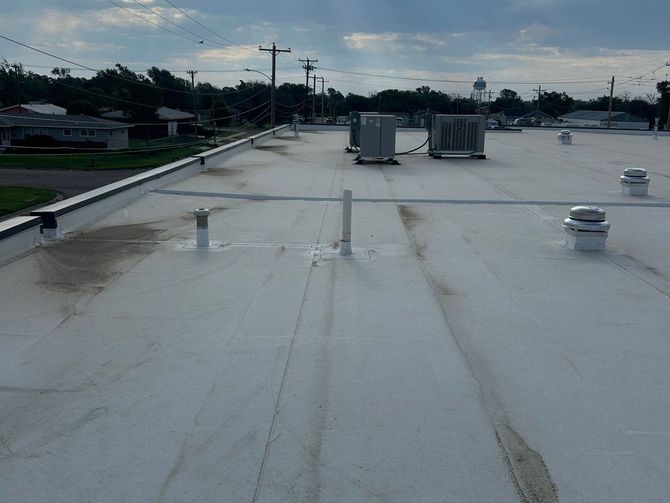Flat roofs have gained popularity in recent years for commercial properties due to their numerous advantages, such as cost savings, low-maintenance needs, and versatility. This article highlights why flat roofs are a smart investment for your commercial building, offering long-term savings and functionality.
Why Flat Roofs Are Beneficial for Commercial Properties
One of the biggest advantages of flat roofs for commercial buildings is their versatility. They are quicker to install than traditional pitched roofs, which reduces labor costs and installation time. This makes them a more efficient choice for commercial builders.
Another major benefit of flat roofs is their ability to maximize available space. The flat surface can be utilized for purposes like placing HVAC systems, solar panels, or even developing rooftop gardens. This is especially valuable for commercial buildings in crowded urban environments.
Flat Roof Materials: EPDM, TPO, and PVC
Flat roofs are made from a range of materials, each offering specific advantages. The most popular materials for commercial flat roofing are as follows:
EPDM Roofing: Durability and Weather Resistance
EPDM (Ethylene Propylene Diene Monomer) is a synthetic rubber that excels in durability and weather resistance. It’s ideal for flat roofs in both hot and cold climates due to its ability to withstand extreme weather. EPDM is easy to install, and its low-maintenance nature ensures long-term protection against leaks.

TPO (Thermoplastic Olefin)
TPO is a reflective material that helps improve energy efficiency by reducing heat absorption. It’s highly resistant to UV rays and ozone, making it a great option for commercial buildings in areas with strong sun exposure. TPO also provides excellent puncture resistance and can withstand harsh weather conditions.
PVC (Polyvinyl Chloride)
PVC (Polyvinyl Chloride) is a highly durable material that resists water, fire, and chemicals. Known for its long lifespan, PVC is ideal for high-traffic areas due to its resistance to wear and tear. PVC offers excellent protection for flat roofs in harsh conditions and with heavy use.
Maintenance Tips for Flat Roofing Longevity
Flat roofs are sturdy but need regular maintenance to last longer. Below are some key maintenance tips to help you keep your commercial flat roof in top condition:
- Make sure to inspect your roof frequently for debris that could clog drainage systems, such as leaves or branches.
- Keep gutters and downspouts clear of blockages to avoid water accumulation.
- Arrange for yearly roof inspections with a qualified roofing professional to detect any wear and tear.
- Make necessary repairs promptly to avoid further damage, especially if there are cracks or punctures in the roofing material.
Cost-Effectiveness of Flat Roofs Over Time
Flat roofs provide excellent value over time. Their lower initial installation costs and easier maintenance can save you money in the long run. The simplicity of inspections and repairs helps reduce ongoing expenses.
The flat roof offers the opportunity to use the space for energy-saving purposes, such as adding solar panels or HVAC systems. This can reduce energy costs, and flat roofs often help improve insulation, lowering heating and cooling expenses.
Conclusion: Why Flat Roofs Are the Right Choice for Your Business
Flat roofs provide excellent value for commercial properties by offering benefits like cost savings, low maintenance, and versatility. By selecting the appropriate roofing material and ensuring proper maintenance, you can extend the life of your flat roof and ensure lasting value for your business.
Want to know more about flat roofing? Get in touch with us for a free consultation, and we’ll guide you toward the best flat roofing options for your business.
#FlatRoofing #CommercialRoofing #RoofInstallation #EPDM #TPO #PVC #RoofMaintenance #EnergyEfficiency #BusinessRoofing